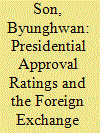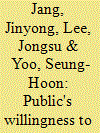| Srl | Item |
| 1 |
ID:
181395


|
|
|
|
|
| Summary/Abstract |
Do presidential approval ratings affect exchange rates? The empirical purview of the vast literature on this topic has been confined to the run-up to elections. The importance of approval ratings in non-election periods has therefore been under-studied. Examining daily data on the exchange rate of the Korean won during the presidency of Park Geun Hye, we find that the won weakened (1) when Park’s ratings were low and (2) when they bounced back unexpectedly from a low level. This finding explains why Park’s impeachment did not lead to a serious panic in the won market. It seems that well before the impeachment, the exchange rate already reflected the market’s concerns about the uncertainty in the government.
|
|
|
|
|
|
|
|
|
|
|
|
|
|
|
|
| 2 |
ID:
132637


|
|
|
|
|
| Publication |
2014.
|
| Summary/Abstract |
With the increasing importance of natural gas (NG) in the energy mix, the search for a reliable liquefied NG (LNG) supply has received great attention along with energy security in Korea. However, the current level of LNG supply reliability in Korea is much lower than that in other industrialized countries. In order to improve the reliability of the LNG supply, diverse policy measures are required, which come at an additional cost paid by society. This study aims to investigate the public×s willingness to pay (WTP) for improving the reliability of the LNG supply by increasing the LNG storage rate from the current level (11%) to 20%. To this end, the contingent valuation (CV) method is applied by using national survey data of 1000 households. In particular, this study employs a one-and-one-half-bound (OOHB) dichotomous choice model, combined with a spike model, to address the responses from the CV survey with zero WTP. The annual mean WTP is estimated to be KRW 9641 (USD 8.68) per household. Expanding the value to the national population provides a value of KRW 169.43 billion (USD 152.55 million). The results indicate that people are willing to shoulder the burden of safeguarding a reliable supply of LNG.
|
|
|
|
|
|
|
|
|
|
|
|
|
|
|
|